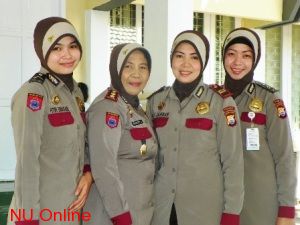Jakarta, NU Online
Muslim and human rights groups called on National Police chief Gen. Timur Pradopo to revoke a 2005 ban on hijabs in the police corps.<>
A decision made by then National Police chief Gen. Da’i Bachtiar in 2005, orders all members of the corps to only wear official uniform and specifically prohibited female officers from wearing hijabs.
The ban, if violated, could result in dismissal.
Female members of the corps Aceh are excluded from the regulation given the province’s 2001 Sharia-inspired bylaws that oblige all women to cover their hair.
Poengky Indiarti, the executive director of rights watchdog Imparsial, urges Timur to review the decree to restore justice and religious freedom.
“The opportunity to become a member of the police force should be equal, including for Muslim women who wear hijabs. It’s discrimination if only female members of the corps in Aceh are allowed to wear the garb,” Poengky said on Sunday.
Separately, Muslim scholar Azyumardi Azra said by lifting the ban on hijabs, the police would be uphold one of the country’s founding principles.
“By allowing female members of the police to wear hijabs, the National Police would uphold the country’s motto of Bhinneka Tunggal Ika [Unity in Diversity],” he told The Jakarta Post.
Azyurmadi said that the police should be open to all interpretations of Islamic teachings.
He said that some Muslim scholars saw head covering for Muslim women as compulsory while others consider it optional.
Amidhan Shaberah of the Indonesian Ulema Council (MUI), said the hijab ban showed that the police were a “repressive institution”.
He said that the MUI was expected to deliberate the issue in an internal meeting in the near future.
A chorus of rejection toward the ban has also been voiced by the National Commission on Human Rights (Komnas HAM) and the Indonesian Police Watch (IPW).
“In Indonesia, many institutions have allowed their employees to wear hijabs. I urge policewomen to look for support from the House of Representatives’ Commission III on legal affairs and the Women’s Empowerment and Child Protection Ministry for the abolition of the ban,” IPW chairman Neta S. Pane said.
Supporters of the ban have argued that hijabs could compromise a female officer’s work, especially during conflicts involving two groups of faiths or in religious conflicts.
National Police spokesman Brig. Gen. Ronny Sompie previously said that the police would not change their policy.
Ronny said the police had their own dress code and that everyone applying for a position within the corps should be aware of the regulation.
“This has nothing to do with human rights or privileges. The National Police have their own regulations,” he said on Friday.
National Police Commission (Kompolnas) member Adrianus Meliala, however, signaled that the force would bow to the mounting protests against the ban.
“According to the National Police General Supervision Inspectorate, they will issue a regulation that allows female police officers to wear hijabs, but they have to be taken off during official ceremonies,” he said recently.
Another police spokesperson, Sr. Comr. Agus Rianto, said that the protests would not influence the police to change their policy.
“We are complying with the decree until it is amended,” he said.
Editing by Sudarto Murtaufiq
Terpopuler
1
Panduan Shalat Gerhana Bulan Petang Ini, Mulai Niat hingga Salam
2
PBNU Instruksikan Qunut Nazilah Respons Agresi Israel-AS ke Iran
3
Jadwal Cuti Bersama dan WFA Lebaran 2026, Total Libur Capai 16 Hari
4
Ketua Umum PBNU Mengutuk Serangan AS-Israel atas Iran
5
Khutbah Gerhana Bulan: Tanda Kekuasaan Allah dan Kesempatan Beramal Saleh
6
Amalan-amalan yang Dianjurkan ketika Terjadi Gerhana Bulan
Terkini
Lihat Semua
















